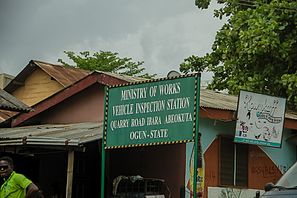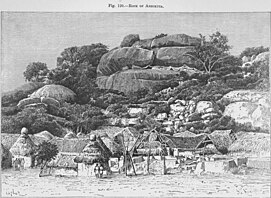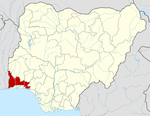Abeokuta

 Clash Royale CLAN TAG#URR8PPP
Clash Royale CLAN TAG#URR8PPP | Abeokuta | |
|---|---|
City | |
 | |
 Abeokuta Location in Nigeria | |
Coordinates: 7°9′39″N 3°20′54″E / 7.16083°N 3.34833°E / 7.16083; 3.34833Coordinates: 7°9′39″N 3°20′54″E / 7.16083°N 3.34833°E / 7.16083; 3.34833 | |
| Country | |
| State | Ogun State |
| Founded | 1830 |
| Area | |
| • City | 879 km2 (339 sq mi) |
| Elevation | 66 m (217 ft) |
| Population (2006[1]) | |
| • City | 451,607 |
| • Density | 510/km2 (1,300/sq mi) |
| • Metro | 1,117,000 |
| Climate | Aw |
Abeokuta is the largest city and state capital of Ogun State in southwest Nigeria. It is situated on the east bank of the Ogun River, near a group of rocky outcrops in a wooded savanna;[2] 77 kilometres (48 mi) north of Lagos by railway, or 130 kilometres (81 mi) by water. As of 2006[update], Abeokuta and the surrounding area had a population of 449,088.
Contents
1 Geography and economy
2 Transportation
3 History
4 Notable buildings
5 Notable natives and residents
6 Photo gallery
7 References
8 External links
Geography and economy
Abẹokuta lies in fertile country of wooded savanna, the surface of which is broken by masses of grey granite. It spreads over an extensive area, being surrounded by mud walls 18 miles in extent.[3]Palm oil, lumber, natural rubber, yams, rice, cassava, maize, cotton, other fruits, and shea butter are the chief articles of trade. It is a key export location for cocoa, palm products, fruit, and kola nuts.[2] Both rice and cotton were introduced by the missionaries in the 1850s and have become integral parts of the economy, along with the dye indigo.
Abeokuta lies below the Olumo Rock, home to several caves and shrines.[4]
The town depends on the Oyan River Dam for its water supply, which is not always dependable.[5]
The dam is situated in the Abeokuta North local government area of Ogun State in the West of Nigeria, about 20 km northwest of the state capital Abeokuta. The dam crosses the Oyan River, a tributary of the Ogun River.
Abeokuta is the headquarters of the federal Ogun-Oshun River Basin Authority, which is responsible for development of land and water resources for Lagos, Ogun, and Oyo states. Included in this are irrigation, food-processing, and electrification.[2]
Local industries include but not limited to fruit canning plants, plastics, breweries, sawmills, and an aluminum products factory. South of town are the Aro granite quarries.[2]
Transportation
Abeokuta is connected to nearby Lagos by a railway that was completed in 1899, with a length of 77 kilometres (48 mi). Roads connect it to Lagos as well as Ibadan, Ilaro, Shagamu, Iseyin, and Ketou.[2]
History
Sodeke first settled Abeokuta (meaning literally "the underneath of the rock"[6] or indirectly "refuge among rocks")[2] in 1830 as a place of refuge from slavehunters from Dahomey and Ibadan. The village populations scattered over the open country to take refuge among the rocks surrounding the city. Here they formed a free confederacy of many distinct groups, each preserving the traditional customs, religious rites and the names of their original villages.[3]
The original settlers of Abeokuta were of the Egba nation,[7] fleeing from the Oyo Empire, which was collapsing.[2] Later, some members of other Yoruba tribes came to the settlement. Baptist and Anglican missionaries from Great Britain began to serve the area in the 1840s,[2][7] in addition to Sierra Leone Creoles.
Because Abeokuta was in a key location for the palm oil trade and because it was the so-called capital of the Egbas, Dahomey soon became hostile. In the 1851 Battle of Abeokuta, the Egba, with assistance from missionaries and armed by the British, defeated King Gezo and the Dahomey incursion. They again beat back the Dahomey military in 1864.[2][7]
The 1860s also saw problems arise with the Europeans, namely the British in Lagos, which led to the Egba first closing trade routes, followed by the expulsion of missionaries and traders in 1867.[2]
Between 1877 and 1893 the Yoruba Civil Wars occurred, and Abeokuta opposed Ibadan, which led the king or alake of the Egba to sign an alliance with the British governor, Sir Gilbert Carter. This occurred in 1893, which formalized the Egba United Government based in Abẹokuta which became recognized by the United Kingdom.[2] In 1914, the city was made part of the colony of Nigeria by the British.[2][7]
In 1918, the Abeokuta Riots took place which was related to the levying of taxes and the policy of indirect rule by Sir Frederick Lugard, the British Governor-General.[2]
The Abeokuta Women's Revolt, led by the Abeokuta Women's Union (AWU), took place in the 1940s. It was a resistance movement against the imposition of unfair taxation by the Nigerian colonial government.[8]
In 1976, Abeokuta became the capital of the newly created Ogun State.
Notable buildings
Abeokuta was a walled town and remnants of the historic wall still exist today. The Ake, the traditional residence of the Alake, along with Centenary Hall (1930). There are secondary and primary schools and the University of Lagos Abeokuta Campus opened in 1984.[2] This campus specializes in science, agriculture, and technology. This has since been changed to an independent full-fledged tertiary institution, Federal University of Agriculture, Abeokuta (UNAAB) in 1988.
The Green Legacy Resort, is a large resort/hotel built by former president Olusegun Obasanjo and investors. The Olusegun Obasanjo Presidential Library (OOPL) is also located within the grounds of the resort.
Notable natives and residents
Shane Lawal, basketball player
Sara Forbes Bonetta, Egbado princess of the Yoruba people, goddaughter of Queen Victoria
Madam Tinubu, titled aristocrat.
Moshood Kashimawo Olawale Abiola, businessman, politician and presidential candidate
Olusegun Obasanjo, President of Nigeria from 1999 to 2007
Funmilayo Ransome-Kuti, women's rights activist
Bola Ajibola, former World Court juror- Chief Frederick Rotimi Williams, legal scholar
- Chief Akintola Williams, accountant, founder of ICAN
- Kuforiji Olubi
Wole Soyinka, Nobel Prize-winning author.
Olikoye Ransome-Kuti, professor of pediatrics, former Minister of Health
Fela Kuti, musician and political activist
Tunji Oyelana, musician, actor, folk singer and composer
Ernest Shonekan, businessman and former interim government head of Nigeria
Jimi Solanke, actor, musician, storyteller and playwright
Ebenezer Obey, juju musician and evangelist- Chief Olusegun Osoba, politician and businessman
- Dr. Tunde Bakare, Pastor
- Sabur Oladimeji Bankole, politician and businessman
- The Alake of Egbaland Oba Adedotun Aremu Gbadebo III, paramount ruler and businessman
Segun Odegbami, footballer and sport analyst
Mudashiru Lawal, footballer and sport analyst
Ike Shorunmu, footballer and coach- Oba Adedapo Tejuoso, monarch and businessman
Bisoye Tejuoso, businesswoman- Sir Shina Peters, musician and businessman
Akin Ogungbe, film actor, film maker, producer and director
Photo gallery
- Some important places in Abeokuta

Akin Olugbade Social Centre, Owu, Abeokuta, Ogun state

Abeokuta Girls Grammar School, Onikolobo, Abeokuta, Ogun state

Entrance of Olumo Rock

Moshood Abiola Polytechnic, Main Entrance

Owu entrance to Chief Olusegun Obasanjo family house

Ministry of works vehicle inspection station sign-post, Abeokuta, Ogun state

Kuto Road in Abeokuta.

The "Rock of Abeokuta", as drawn c.1892

Aerial view of Abeokuta, 1929

Diocese of Egba (Anglican Communion)
References
| Wikimedia Commons has media related to Abeokuta. |
^ "FEDERAL REPUBLIC OF NIGERIA : 2006 Population Census" (PDF). Web.archive.org. Archived from the original (PDF) on 5 March 2012. Retrieved 25 July 2016..mw-parser-output cite.citationfont-style:inherit.mw-parser-output qquotes:"""""""'""'".mw-parser-output code.cs1-codecolor:inherit;background:inherit;border:inherit;padding:inherit.mw-parser-output .cs1-lock-free abackground:url("//upload.wikimedia.org/wikipedia/commons/thumb/6/65/Lock-green.svg/9px-Lock-green.svg.png")no-repeat;background-position:right .1em center.mw-parser-output .cs1-lock-limited a,.mw-parser-output .cs1-lock-registration abackground:url("//upload.wikimedia.org/wikipedia/commons/thumb/d/d6/Lock-gray-alt-2.svg/9px-Lock-gray-alt-2.svg.png")no-repeat;background-position:right .1em center.mw-parser-output .cs1-lock-subscription abackground:url("//upload.wikimedia.org/wikipedia/commons/thumb/a/aa/Lock-red-alt-2.svg/9px-Lock-red-alt-2.svg.png")no-repeat;background-position:right .1em center.mw-parser-output .cs1-subscription,.mw-parser-output .cs1-registrationcolor:#555.mw-parser-output .cs1-subscription span,.mw-parser-output .cs1-registration spanborder-bottom:1px dotted;cursor:help.mw-parser-output .cs1-hidden-errordisplay:none;font-size:100%.mw-parser-output .cs1-visible-errorfont-size:100%.mw-parser-output .cs1-subscription,.mw-parser-output .cs1-registration,.mw-parser-output .cs1-formatfont-size:95%.mw-parser-output .cs1-kern-left,.mw-parser-output .cs1-kern-wl-leftpadding-left:0.2em.mw-parser-output .cs1-kern-right,.mw-parser-output .cs1-kern-wl-rightpadding-right:0.2em
^ abcdefghijklmn Hoiberg, Dale H., ed. (2010). "Abeokuta". Encyclopædia Britannica. I: A-ak Bayes (15th ed.). Chicago, IL: Encyclopædia Britannica Inc. p. 27. ISBN 978-1-59339-837-8.
^ ab One or more of the preceding sentences incorporates text from a publication now in the public domain: Chisholm, Hugh, ed. (1911). "Abeokuta". Encyclopædia Britannica. 1 (11th ed.). Cambridge University Press. p. 42.
One or more of the preceding sentences incorporates text from a publication now in the public domain: Chisholm, Hugh, ed. (1911). "Abeokuta". Encyclopædia Britannica. 1 (11th ed.). Cambridge University Press. p. 42.
^
Kola Tubosun (16 April 2014). "Abeokuta's Living History". KTravula.com.
^ Dimeji Kayode-Adedeji (February 23, 2010). "Water scarcity bites harder in Abeokuta". Next. Archived from the original on June 10, 2015. Retrieved May 22, 2010.
^ Bennett, Eric (2010). Encyclopedia of Africa. Oxford: Oxford University Press. ISBN 9780199733903. Retrieved 18 January 2017.
^ abcd Canby, Courtlandt. The Encyclopedia of Historic Places. (New York: Facts on File Publications, 1984), p. 2.
^ Byfield, Judith A. "Taxation, Women, and the Colonial State: Egba Women's Revolt." Meridians: Feminism, Race, Transnationalism, 3.2 (2003): 250-77. Web. 4 Mar. 2013.
External links
- "Abẹ́òkuta's Living History"










